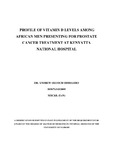| dc.contributor.author | Odhiambo, Andrew O | |
| dc.date.accessioned | 2013-07-31T08:35:19Z | |
| dc.date.available | 2013-07-31T08:35:19Z | |
| dc.date.issued | 2013 | |
| dc.identifier.citation | Degree Of Master Of Medicine In Internal Medicine, University Of Nairobi, 2013 | en |
| dc.identifier.uri | http://erepository.uonbi.ac.ke:8080/xmlui/handle/11295/52894 | |
| dc.description.abstract | Background: Few studies have examined vitamin D profile in African men with prostate cancer.
Considerable epidemiological, in vitro, in vivo and clinical data support an association between vitamin D deficiency and prostate cancer outcome. The vitamin D status in patients with prostate cancer in Kenya is unknown. This study aimed to determine the profile of vitamin D levels in patients with prostate cancer and to correlate this with patient and disease characteristics.
Methods: This was a hospital-based cross-sectional study that evaluated African men with histologically confirmed prostate cancer who sought ambulatory care at KNH from April 2012 to June 2012. Social and medical histories were obtained by direct interview and the information recorded in questionnaires. Every participant had their anthropometric measurements taken and plasma samples drawn for 25-hydroxyvitamin D (25-VD) concentrations. The relationship
between age, body mass index, serum pre-diagnostic PSA and Gleason score on vitamin D status was evaluated using univariate and multivariate analysis.
Results: A total of 162 African men were evaluated. The mean 25-VD was 19.15 ng/rnl and 144 (88.9%) men were classified as having vitamin D deficiency (25-VD < 30ng/rnl). Of the total population, 29 (17.9%) were severely deficient (25-VD < 10ng/rnl), 115 (71%) were moderately deficient (10-29 ng/rnl) and 18 (11.1%) were normal (30-100ng/rnl). Gleason scores greater than 7 (OR 2.9; 95% CI 1.5-5.5, p = 0.001) and serum PSA 2: 50ng/ml (OR 2.2; 95% CI 1.7-5.1, p = 0.014) were associated with vitamin D deficiency (25-VD < 20ng/rnl) whereas age and BMI were not. Adjusted for age, BMI and serum PSA levels, having Gleason scores higher than 7 was independently associated with vitamin D deficiency (OR 2.5; 95% CI 1.2-4.9, P = 0.01).
Conclusion: Vitamin D deficiency is common in African men with prostate cancer, particularly in those higher Gleason scores. This deficiency may impact negatively on prognosis. | en |
| dc.language.iso | en | en |
| dc.publisher | University of Nairobi | en |
| dc.title | Profile of vitamin D levels among African men presenting for prostate cancer treatment at Kenyatta national hospital | en |
| dc.type | Thesis | en |
| dc.description.department | a
Department of Psychiatry, University of Nairobi, ; bDepartment of Mental Health, School of Medicine,
Moi University, Eldoret, Kenya | |
| local.publisher | Faculty of medicine | en |

